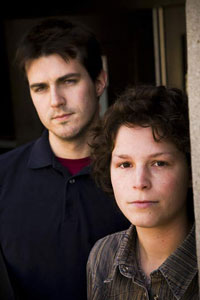Students school McGill on sustainability
Students school McGill on sustainability McGill University
User Tools (skip):
SUSTAINABILITY ISSUE
Students school McGill on sustainability

POISSON AND CHAMPOUX-WILLIAMS: The ledger doesn't lie
It’s a classic tale of tables being turned. After spending their entire academic lives at the mercy of the caprices of the marking system, four final-year students at the McGill School of the Environment find themselves with the chance to prepare a sustainability report card that grades their alma mater on everything from the spheres of education and economics to physical operations and governance.
Dustin Dahle, Kathryn Butler, Lynne Champoux-Williams and Alexandre Poisson volunteered for the task as part of Professor Garry Peterson’s ENVR 401, “Environmental Research” course last semester. The quartet, which began as a sextet before two members left the project, has been working non-stop ever since.
One of the first tasks, was to formulate an evaluation system that worked for McGill. “Our goal was to have something that was specific to McGill but that would also be compatible with peer institutions,” says Champoux-Williams. “But the project was so broad, we had to narrow it down.”
More than just a typical class project, the sustainability report card was conceived as a legitimate working document that would, ideally, stand as a template for regular such assessments each year. An exciting project, to be sure, but one whose scope bordered on monumental.
“It’s huge,” sighs Poisson when asked about his portion of the evaluation process—to assess the sustainability of McGill’s physical operations from green building policy to hazardous waste disposal.
Luckily for Poisson, Jim Nicell, Associate Vice-Principal, University Services, came onboard immediately. “Why not tap into this great resource,” shrugs Nicell when asked why he so readily let the students peek behind the curtain of University Services. “They have great ideas and I certainly want to hear them.”
With Nicell in his corner, Poisson’s initial misgivings about the reticence of staff to supply an unknown student with critical operations data proved to be utterly unfounded. “People have been remarkably cooperative,” says Poisson. “In fact, once they realized that the plan was to actually implement the findings of this project, they really went that extra mile to help us.”
As a result, the report card’s most detailed section is that of physical operations, although the goal remains to have a complete document to present at the seventh annual Rethink conference on March 28.
And so, how did McGill fare under scrutiny? “We’re strong in some areas and weaker in others,” says Poisson diplomatically. McGill’s status as one of the nation’s most research-intensive universities, combined with an infrastructure made up, in part, of older, heritage buildings means that it doesn’t score highly in terms of green building initiatives or energy consumption—both areas highlighted in McGill’s Master Plan.
But Poisson admits that even these challenges are being met, with Dennis Fortune leading a Green Buildings Working Group that will implement Green Building Standards at McGill by the spring. That means all construction and renovation will have to meet a set of very specific, very sustainable codes. “We’ll see how much impact this will with next year’s assessment,” concedes Poisson.
Like all students, McGill has those areas in which it excels—none more than in the realm of land ownership and nature conservation. Seventy five percent of McGill’s land footprint is natural habitat, made up of the Gault Nature Reserve, the Macdonald Arboretum and the Molson Reserve, with the downtown campus representing a mere two percent of that area.
“McGill has a well-established tradition of nature conservation,” says Poisson. “But the really impressive thing is how these habitats are also being monitored extensively and being used by researchers and students alike.”
One of the areas both students agree needs shoring up is education and communication. They point to the ongoing uphill battle with campus recycling. While they give high marks to Building Services for installing some 300 new indoor recycling stations, they think more needs to be done to lower the rate of contamination, in which someone throws a banana peel into the wrong bin and condemns the whole lot to be thrown into the garbage. “Why not use Discover McGill for education purposes,” asks Champoux-Williams. “This the doorway into McGill for new students. Have a workshop that explains how to recycle properly.”
If nothing else, Champoux-Williams and Poisson hope their report card sparks debate “Awareness of there being such an evaluation is important and so is disagreement,” says Poisson. “Who cares about the grade? Let’s get people talking and sitting down at the table to agree on what the standards and goals should be.”

